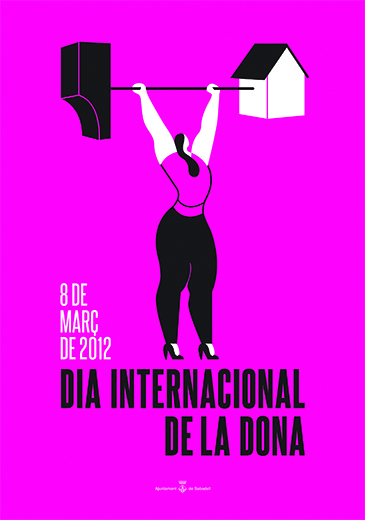"Women's Rights are Human Rights"
February 6, 2021

Event Info
Gallery Exhibition coming Fall 2021
Gallery Exhibition | "Women's Rights are Human Rights"About the Exhibition
 Women's Rights Are Human Rights is a very fitting title for an exhibition of Women’s rights and advocacy posters, as it is a term used in the women's rights movement and was the title of an important speech given by Hillary Rodham Clinton at the United Nations Fourth World Conference on Women in Beijing in 1995. In her speech, Hillary Clinton suggests that “if the term women's rights were to be interchangeable with the term human rights the world community would be a better place because human rights affect the women who raise the world's children, care for the elderly, run companies, work in hospitals, right for better education and better health care.”
Women's Rights Are Human Rights is a very fitting title for an exhibition of Women’s rights and advocacy posters, as it is a term used in the women's rights movement and was the title of an important speech given by Hillary Rodham Clinton at the United Nations Fourth World Conference on Women in Beijing in 1995. In her speech, Hillary Clinton suggests that “if the term women's rights were to be interchangeable with the term human rights the world community would be a better place because human rights affect the women who raise the world's children, care for the elderly, run companies, work in hospitals, right for better education and better health care.”
Yet gender inequalities remain deeply entrenched in every society. Women lack access to decent work and face occupational segregation and gender wage disparities. Women are often denied access to basic education and health care, suffer from violence and discrimination, and are under-represented in political and economic decision-making processes.
 This exhibition features posters created by both men and women to celebrate and acknowledge the vital role that all citizens should play in protecting and promoting human rights while actively challenging gender inequality and stereotypes, advancing sexual and reproductive rights, and protecting women and girls against brutality.
This exhibition features posters created by both men and women to celebrate and acknowledge the vital role that all citizens should play in protecting and promoting human rights while actively challenging gender inequality and stereotypes, advancing sexual and reproductive rights, and protecting women and girls against brutality.
In their collective visual voice, these posters promote women’s empowerment and participation in society while challenging religious and cultural norms and patriarchal attitudes that subordinate, stigmatize or restrict women from achieving their fullest potential.
Organized and curated by:
Elizabeth Resnick, Professor Emerita, Graphic Design
Massachusetts College of Art and Design, Boston
About the Curator

Elizabeth Resnick
Elizabeth Resnick is a Professor Emerita, former chair of Graphic Design, and current part-time faculty at Massachusetts College of Art and Design, Boston, Massachusetts. She earned her B.F.A. and M.F.A. degrees in Graphic Design from Rhode Island School of Design, Providence, Rhode Island.
Elizabeth Resnick Design, an independent Boston design studio was in operation from 1973–1996. Clients included: Ciba Corning Diagnostics Corporation, Store 24, Animal Rescue League of Boston, AIGA Boston, Massachusetts College of Art, and other area schools plus many local non-profit cultural organizations.
Professor Resnick is a passionate design curator who has organized seven comprehensive design exhibitions: Within/Without: The Art of Russell Mills with Teresa Flavin (1991); Dutch Graphic Design: 1918–1945 with Alston Purvis (1994); The Art of the Poster: Makoto Saito with Jan Kubasiewicz (1999); The Graphic Imperative: International Posters of Peace, Social Justice and The Environment 1965–2005 with Chaz Maviyane-Davies and Frank Baseman (2005); Graphic Intervention: 25 Years of International AIDS Awareness Posters 1985–2010 with Javier Cortés (2010); Graphic Advocacy: International Posters for the Digital Age: 2001–2012 (2012) and currently Women’s Rights Are Human Rights: International Posters on Gender-based Inequality, Violence and Discrimination (2016) which investigates gender-based inequalities deeply entrenched in every global society.
Her publications include catalogs for most of the exhibitions mentioned above plus The Social Design Reader Bloomsbury Visual Arts (2019), Developing Citizen Designers, Bloomsbury Academic (2016), Design for Communication: Conceptual Graphic Design Basics, John Wiley & Sons Publishers (2003) and Graphic Design: A Problem-Solving Approach to Visual Communication, Prentice-Hall Publications”(1984).
She has led poster workshops and lectured throughout the United States, Mexico, Ireland, Great Britain, China, South Korea, Iceland, Taiwan, Bolivia, Krakow, and Warsaw. Her posters have been accepted at the Warsaw Poster Biennial and Mexican Poster Biennial and she frequently participates in International poster invitational exhibitions.